Stay in the know on all smart updates of your favorite topics.
Demoday #27: What is ethical mobile software for your phone?
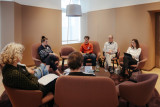
We depend heavily on Big Tech companies like Google, Meta, Apple, Amazon, and more. And with your smartphone, there is no escaping them. Even if you don’t use social media, and use anti-tracking software, some of your data will still be shared and sold. This can make you feel pretty uncomfortable. Especially, since most of these tech companies are in the USA and China. This is why, in this session, we worked on the question: Is it possible to develop mobile software which is ethical and functional?
Danny Lämmerhirt from Waag Futurelab works on the MOBIFREE project. This project aims to change the development and use of mobile software in Europe by citizens, businesses, non-profits and governments. In doing so, they want to support the emerging movement for ethical mobile software consisting of organisations that adhere to European values such as openness, privacy, digital sovereignty, fairness, collaboration, sustainability, and inclusivity.
In this session, Danny introduced us to the smartphone they are working on. This smartphone has its hardware from Fairphone (an ethically produced smartphone) and uses a privacy-friendly operating system: Murena. This operating system is an Android fork that doesn’t come with standard tracking software. On top of that, it has an app store with only ethical apps and is connected to an ethical European cloud.
Outcomes
We discussed with the group what values we found most important in an ethical mobile phone when using it for work. The values that were deemed most important by the group were:
- Autonomy: A smartphone allows working wherever and whenever you want. It is an incredibly powerful tool that you can use for so many different things, and it fits in your pocket.
- Independency: We’ve become incredibly dependent on our smartphones. When you lose your phone, you no longer have your money, your public transport card, a map to find the way, etc. On the other hand, this also means that you don’t need to travel with a bag full of tools every time you leave the house.
- Privacy: Constantly being tracked has become normal, but that doesn't mean we’re happy with it. Right now, you don’t have a choice. It would be nice to have a choice, to either pay with your data, or with money.
- User-friendliness: An ethical and privacy-friendly smartphone sounds great, but it also means that you can no longer use many of the apps that you’re used to. Will it still be practical to use? And will it be intuitive? We are all used to a certain way of working and are hesitant to change.
This discussion was definitely food for thought. We all want a more ethical phone, but are not willing to sacrifice much in return…
Are you interested in trying out this ethical smartphone? The MOBIFREE project is currently looking for people who can test this smartphone. They are looking for young adults, civil servants, mobile software developers, and professionals working in humanitarian organisations.
<strong>Would you like to participate, or do you have any questions about this project? Please contact Noor at noor@amsterdaminchange.com. Special thanks to Danny Lämmerhirt for this interesting session.</strong>
Smart City Expo World Congress | Barcelona 2024 | Personal highlights
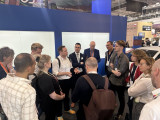
In early November, I travelled to Barcelona for the third time to attend the Smart City Expo World Congress. Together with the Amsterdam InChange Team, some of our network partners, and the Dutch delegation, we put together a strong content-focused programme, gained inspiration, and strengthened both international and national connections. In this article, I’ll briefly share some of my personal highlights from this trip.
International Delegations: Building International Connections and Knowledge Exchange at the Expo
During the congress, I organised several guided visits from the Dutch Pavilion in collaboration with the DMI-Ecosystem. The aim of these visits was to connect the Dutch delegation with international colleagues and facilitate knowledge exchange. At the busy expo, full of companies, cities, regions, and conference stages, it’s really appreciated to join planned meetings on specific themes. It’s also a great chance to meet many international representatives in just a few days, since everyone is in the same place at the same time.
We visited and connected with the pavilions of EIT Urban Mobility, Forum Virium (Helsinki), the European Commission, and Catalonian innovations. Topics such as The Future of Mobility, Digital Twins, and Net Zero Cities were central to the discussions. It was a good opportunity to strengthen existing networks and establish new connections. For myself, for Amsterdam InChange, and for the participants joining the meetings.
A few aspects of the visits particularly stood out to me. At Forum Virium Helsinki we met with Timo Sillander and Jaana Halonen. I was impressed by their work with Digital Twins. They focus not only on the technology itself and the efficiency of urban systems, but also on the social dimensions a digital simulation can play into. Think of; unequal distributions of risks related to climate change and extreme weather conditions.
I also appreciated the efforts of the European Commission. They are working to make it easier to navigate research topics, funding opportunities, and findings related to themes like energy-neutral cities. With their new marketplace, there is more focus on small and medium-sized cities across Europe, helping them to benefit from innovations that are often developed in larger urban areas.
Collaborating Internationally on a Regional Challenge: Zero-Emission Zones and City Logistics
On Tuesday, my colleague Chris and I organised a session on zero-emission city logistics. We brought together representatives from Oslo, Helsinki, Stockholm, Munich, and EIT Urban Mobility, as well as the Dutch municipalities of Haarlemmermeer and Amsterdam.
The session built on connections we made during other events on Sunday and Monday, bringing together an international group of stakeholders interested in this topic. During the discussion, we compared how different cities are approaching zero-emission zones and identified shared challenges, particularly in policymaking and working with logistics companies and local entrepreneurs.
It was interesting to see how this topic lends itself so well to international comparison and exchange. For instance, while Amsterdam will be one of the first to implement a strict ZE zone in the city centre, other cities are already ahead in areas like charging infrastructure and the transition to cargo bikes. The group was eager to keep the discussion going, and we’re already planning a follow-up online meeting to continue learning from one another.
Future-Proof Sports Fields, International Dinners, and Bicycles
Finally, a few other topics worth mentioning: I joined an international session hosted by the City of Amsterdam about future-proof sports fields. It was inspiring to reflect on the value and potential of sports fields for neighbourhoods, as well as their use as testing grounds for sustainable innovations. For me, the session reinforced how important these spaces are for local communities in cities, and sparked a new personal interest in this subject.
I also really enjoyed both our own international changemakers’ dinner and another international dinner hosted by Drees & Sommer (thanks for the invitation!). Bringing together an international network — whether as individuals or in small groups — and mixing them at the table sparked meaningful conversations that felt different from those during the formal congress sessions or workshops.
Lastly, it’s great to see more Superblocks and bicycles in the city every year! Go Barcelona!
Data Dilemma's verslag: De Voedseltransitie
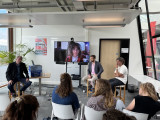
Op 30 mei nodigden we onze community uit bij AMS Institute op het Marineterrein voor een Data Dilemma’s event over de Voedseltransitie. Het ging deze middag over technische dilemma’s rond data en de verduurzaming van voedselketens, en; wat is nou echt lokaal voedsel?
Data Commons: Een digitaal gemeenschapsgoed met een gezamenlijk doel
Jan Wester, directeur van Big Data Value Center, vertelde ons meer over het project ‘Data Value Center Agri & Food Korte Keten’. Aanleiding voor dit project is de transitie naar een duurzamer voedselsysteem waarbij digitalisering en data een belangrijke rol spelen. Er is de wens dat relatief meer voeding uit de regio komt (in plaats van langere ketens), dat er meer transparantie en efficiëntie is in ketensamenwerking en dat er meer informatie wordt vastgelegd over productie en herkomst (denk aan True Pricing). Dit vraagt om een neutraal precompetitief platform. Dit platform kan je zien als een zogenaamde Data Commons: een digitaal gemeenschapsgoed waarin je samen afspraken maakt over het delen van data; wat deel je, met wie, en wat is het gezamenlijke doel ermee?
De Agrifood Data Common is een veilige data-deel omgeving/marktplaats/dashboard, met verschillende gebruikersgroepen. Ondernemers kunnen hiermee bijvoorbeeld markten transparanter maken, ketensamenwerking verbeteren en meervoudige verdienmodellen creëren. Overheden kunnen gebruik maken van de omgeving voor meer evidence-based beleid en het monitoren van impact. Ten slotte kunnen kennisinstellingen gebruik maken van het platform voor de opbouw van referentiedata en het delen van data uit experimenten en fieldlabs. Belangrijk is dat de verschillende partijen vertrouwen met- en in elkaar opbouwen om dit samen te laten werken.
De cateringketen van de Hogeschool van Amsterdam als case
DVC Agri & Food is samen met partners cases aan het bouwen die het nut en belang van dit digitale gemeenschapsgoed in de praktijk tonen. Kees Willem Rademakers van de Hogeschool van Amsterdam vertelde ons meer over het ‘Food Governance 2.0’ project met betrekking op hun eigen cateringketen.
De HvA wilt zich actiever afvragen wat ze van (hun) voedsel vinden en hoe ze een nieuwe rol kunnen spelen in hun eigen lokale voedselsysteem. Ze kijken naar factoren als gezondheid, biodiversiteit, betaalbaarheid en energiegebruik. Als je hier kritisch naar wilt kijken blijkt hoe moeilijk het is om te onderzoeken waar kantineproducten precies vandaan komen. De precieze oorsprong, de reizen die het afgelegd heeft, de arbeidsomstandigheden; het zijn onderdelen waar je als afnemer grip op- of in ieder geval een beeld van wilt hebben. Er is nu een ongelijke machtsverdeling waarbij de leverancier meer data over de keten bezit en dit gebruikt als verdienmodel.
Binnen een keten die digitaal en transparant is georganiseerd, kan de HvA zien wat er nu gebeurt, kan er onderhandeld worden, en kunnen ze samen gaan hervormen waar ze naartoe willen. Het is belangrijk om daarom de governance structuren over voedselketens en de informatiestructuren daarbinnen opnieuw vorm te geven met elkaar. Jan Wester en Kees Willem Rademakers concluderen samen dat deze hervorming vooral zit in wederkerigheid en bereidheid om meer data met elkaar te delen, en de digitale platformen die dit mogelijk maken.
Flevo Campus: Samen werken aan het stedelijk voedselsysteem van de toekomst
Lenno Munnikes vertelde ons meer over lopende initiatieven bij de Flevo Campus. Een organisatie waar onderzoek, onderwijs, ondernemerschap en overheden samenkomen om samen te werken aan het stedelijke voedselsysteem van de toekomst. Hier verbinden ze economische, maatschappelijke en kennis-vraagstukken op het gebied van een duurzame voedseleconomie en een gezonde voedselomgeving.
In een project rond ‘de supermarkt van de toekomst’ zijn ze aan het experimenteren met het verbreden van het assortiment van lokale producten in de schappen. Als je een deel van een supermarkt bijvoorbeeld reserveert voor lokale ondernemers, ontstaat er al sneller een match tussen lokale consumenten en lokale producenten. Ook wordt er gekeken hoe je stadstuinderijen kan ontwikkelen met een mix van verschillende functies. Naast voedselzekerheid, kan zo’n plek ook een belangrijke educatiefunctie vervullen voor kinderen en jongeren in de buurt, kan er onderzoek plaatsvinden, kunnen er nieuwe verdienmodellen worden uitgeprobeerd, en kan de tuin gekoppeld worden aan een zorgcentrum in de buurt.
Ten slotte vertelde Lenno over hun projecten in de zogenaamde Labs. Hier experimenteren ze op kleine schaal om ons aan het denken te zetten over ons voedselsysteem. Een bekend voorbeeld is het hergebruiken van de ‘reststromen’ van de kip. Na slachting wordt zo’n 70% van het dier als reststroom verscheept naar andere continenten. Maar wat als je nou alles van de kip verwerkt? Hoe kan je omgaan met onderdelen van een dier dat je niet opeet? Met deze vragen gingen ze aan de slag en creëerden ze bijvoorbeeld een tasje van de huid, zeep van het vet en keramiek van de botten. Een experiment als dit kan op kleine schaal worden uitgevoerd, maar via nieuwskanalen veel mensen bereiken en aan het denken zetten over ons voedselsysteem.
Onderzoek naar de klimaatimpact van een voedselketen; van verantwoording naar nieuwsgierigheid
Leen Felix, adviseur Agrifood en Biodiversiteit bij Metabolic, nam ons mee in het proces waarmee ze bedrijven adviseert over de duurzaamheid van hun voedselketen. Het begint simpel, bij de ingrediëntenlijst van een product. In plaats van de locatie van de leverancier, moet je echt op zoek naar de productielocatie; het land van herkomst per ingrediënt. De impact van voedselproductie hangt namelijk af van de combinatie van het productieproces en de productielocatie. Maten van landgebruik, bodemtransformatie en uitstoot van broeikasgassen, bijvoorbeeld, hebben ieder een effect op de natuurlijke omgeving. De ruimtelijke context bepaald hoe schadelijk deze processen zijn voor de aarde en het klimaat. Je kan hierbij denken aan de volgende voorbeelden: Het verbouwen van soja, waarbij veel land voor nodig is, is schadelijker als er regenwoud in Brazilië voor wordt gekapt. Het transformeren en homogeniseren van de bodem is schadelijker voor het klimaat, als dit gebeurt op een plek waar voorheen een relatief hoge mate van biodiversiteit aanwezig is. Water-intensieve productieprocessen hebben meer impact op mens en natuur als het plaatsvind op locaties waar water schaars is.
Metabolic koppelt daarom ruimtelijke context aan productieprocessen. Via scores is te zien hoe de negatieve impact van productieprocessen nog sterker is in ‘gebieden met een gevoeligheid’. Dit legt de complexiteit vast waar je in mondiaal voedselsysteem mee te maken hebt. Hoe meer ingrediënten in een product, hoe meer productielocaties, hoe meer factoren die de klimaatimpact beïnvloeden. Het is voor Leen als analist en adviseur de balans zoeken tussen het weergeven van álle data en de complexiteit van de keten, en het adviseren met een platgeslagen verhaal waar de opdrachtgever soms naar op zoek is. Je wilt een bedrijf niet verlammen met de data, maar ze ook wel gericht handvatten geven om bijvoorbeeld risicolocaties en ingrediënten te vermijden.
Leen sluit af met een drietal lessen voor het publiek:
- Perfecte data bestaat niet, en dat is niet eens zo erg: focus op het verhaal wat je ermee kan en wilt overbrengen.
- Van verantwoording naar nieuwsgierigheid: Je kan dus niet 100% verantwoorden en berekenen, maar je moet wel een nieuwsgierige houding tonen over bijvoorbeeld alle bijkomende milieulasten en context risico’s.
- Geen top 10 maar systeemdenken: Duurzaamheid als een simpel thema laten vallen, het is geen top 10 maar denk in systeem met contrasten, schaal, complexiteit, ruilfuncties. ‘One size fits all’ oplossingen werken niet.
Dank aan de sprekers voor hun verhalen en het publiek voor de levendige discussies na afloop. Wil je bij onze volgende Data Dilemma's zijn? De volgende editie van deze serie open events vindt plaats op 16 juli. Ook staan we altijd open voor nieuwe thema’s en onderwerpen voor deze serie; we zijn benieuwd wat voor data dilemma’s jij mee in aanraking komt bij je werk!
😀Resultaten - Is betrokkenheid van de gemeenschap de moeite waard? 😀

We hebben uiteenlopende en interessante reacties ontvangen van stedenbouwkundigen, architecten en gemeenten. Als u wilt weten wat andere professionals denken, vul dan deze enquête in met uw e-mailadres en wij delen de inzichten met u.
Bedankt! 😀
Follow Playground on LinkedIn
We've received varied and interesting responses from urban developers, architects, and municipalities. If you want to know what other professionals think, please fill out this survey with your email, and we will share the insights with you.
Thank you! 😀
Amsterdamse ziekenhuizen gaan data delen
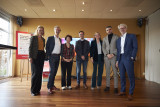
Amsterdam UMC, OLVG en het Antoni van Leeuwenhoek (AVL) gaan elkaars medische data gepseudonimiseerd hergebruiken in Health Data Space Amsterdam.
HDSA is een geheel nieuwe, regionale zorgdata-infrastructuur. Deze ondersteunt patiëntenzorg en medisch wetenschappelijk onderzoek naar gezondheid en preventie. Met als doel: gezondheidsverschillen in de regio te verkleinen en de gezondheidszorg toegankelijk te houden.
Het initiatief van de drie Amsterdamse ziekenhuizen komt voort uit een bredere samenwerking met de Universiteit van Amsterdam, Vrije Universiteit Amsterdam, Gemeente Amsterdam, Amsterdam Economic Board en Philips. Verder trekken de ziekenhuizen nauw op met Amsterdam AI, het Amsterdamse samenwerkingsverband voor kunstmatige intelligentie, en Health-RI, dat zich inzet voor een landelijke geïntegreerde gezondheidsdata-infrastructuur voor onderzoek, beleid en innovatie.
HDSA faciliteert met deze betere en snellere uitwisseling van zorgdata wetenschappelijk onderzoek naar gezondheid, beter medisch inzicht in hoe mensen langdurig gezond kunnen blijven, gepersonaliseerde preventie en behandeling van ziekten. De samenwerking is een eerste stap in de aansluiting op (een nog te bouwen) nationale infrastructuur vanuit het Integraal Zorgakkoord (IZA) en een Europese samenwerking via het European Health Data Space (EHDS).
Lees het complete bericht via
Community Engagement & AI: Free few-click participation framework based on data and science.🎈

Happy Thursday, all 🎈
👯While Playground 🛝 is busy building the product, we actively talk with architects, developers, and governments. One topic that keeps surfacing is that there isn’t a clear and simple framework for starting community engagement and even convincing internal stakeholders to embark on this adventure without knowing the associated costs and best practices.
For that reason, we are releasing the Playground Framework 🪄. With five simple clicks, you can generate an actionable strategy to help you navigate the complexities of making our cities more inclusive.
✨Play with the framework and share your thoughts with us. Link to public demo video 🔗
💌<strong>Our inbox is open;</strong> let’s build the future of our cities together. 🏙️🍃
Nomineer jouw AI-toepassing voor de Dutch Applied AI Award

Heb of ken jij een vernieuwend initiatief op het gebied van toegepaste Artificiële Intelligentie? Nomineer deze toepassing dan voor de Dutch Applied AI Award!
Het is dit jaar voor de vijfde keer dat deze juryprijs tijdens de jaarlijkse Computable Awards wordt uitgereikt. Sinds 2020 beloont het Centre of Expertise Applied AI van de Hogeschool van Amsterdam samen met ICT-platform Computable en podcast De Dataloog een innovatieve AI-toepassing.
Daarbij beoordeelt de jury - bestaande uit vijf experts op het gebied van Applied AI - alle inzendingen op drie criteria:
- Applied AI - in hoeverre is de oplossing al geïmplementeerd, wordt het gebruikt door de beoogde doelgroep en hoe groot is het aantal (potentiële) klanten/het aantal mensen dat met deze innovatie direct of indirect wordt geholpen.
- Uniekheid - in hoeverre is de innovatie de enige in haar soort, is het nooit eerder op de markt gebracht en kan het doel van de innovatie niet op een andere manier worden behaald.
- Responsible AI (transparantie, privacy, fairness, etc.) - in hoeverre is het ontworpen of gebruikte AI-algoritme transparant. Stelt het de gebruiker in staat om verantwoording af te leggen en duidelijk te zijn over de factoren die de algoritmische beslissingen beïnvloeden.
Je kunt een initiatief tot maandag 1 juli voordragen via deze link .
Uit alle inzendingen maakt de jury een top 3. De top 3 wordt op dinsdag 12 november uitgenodigd op de Hogeschool van Amsterdam om zijn innovatieve AI-toepassing te pitchen. De winnaar wordt op donderdag 28 november verkozen tijdens de uitreiking van de Computable Awards in de Jaarbeurs Utrecht.
Eerdere winnaars:
Why we should stop talking about self-driving cars (3/8)

The term 'self-driving car' is used for a wide variety of technical support systems for car drivers. The Society of Automotive Engineers (SAE) has distinguished six types, as mentioned in the tabel above. This classification is recognized worldwide.
At SAE level 0, a car has been equipped with various warning systems, such as unvoluntary deviation from lane, traffic in the blind spot, and emergency braking.
At SEA levels 1 and 2, cars can steer independently or/and adjust their speed in specific conditions on motorways. Whether drivers are allowed to take their hands from the steering wheel depends on national law. That is certainly not the case in Europe. As soon as environmental conditions make steering and acceleration more complex, for example after turning onto a busy street, the driver must immediately take over the steering.
A properly functioning SAE Level 3 system allows drivers to take their eyes off the road and focus on other activities. They must sit behind the wheel and be on standby and are always held responsible for driving the car. They must immediately take over control of the car as soon as 'the system' gives a ('disengagement') signal, which means that it can no longer handle the situation. There is currently no car worldwide that is accredited at SEA-3 level.
This level of control is not sufficient for driverless taxi services. Automotive and technology companies such as General Moters and Alphabet have been working hard to meet the requirements of the higher levels (SAE 4). Their expensive cars (up to $250,000) have automated backups, meaning they can handle any situation under specified conditions, such as well-designed roads, during the day and at a certain speed. Under these circumstances, no driver is required to be present.
SAE Level 5 automation can operate without a driver in all conditions. There is currently no vehicle that meets this requirement.
The variety of options in this classification explains why the term 'self-driving car' should not be used. Cars classified at SAE level 1 and 2 can best be called 'automated cars' and cars from SAE level 3 onwards can be called autonomous cars.
The state of California introduced new rules in 2019 that allow cars at SAE 4 level to participate in traffic. Very strict conditions apply to this. As a result, Alphabet (Waymo) and General Motors (Cruise) have been allowed to launch driverless taxi services. All rides are monitored with cameras to prevent reckless behavior or vandalism.
<strong>Last week, you might have read the last in a series of 25 posts about improving environmental quality. Right now, I have finalized an e-book containing all posts plus additional recommendations. If you follow the link below, you can download the book (90 pages) for free. A version in Dutch language can be downloaded HERE**</strong>
De stad van de toekomst bouwen ze in Almere in Minecraft
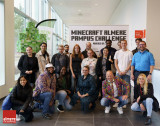
Met een spetterende kick-off door Justin Edwards, Director of Learning Programmes van Microsoft, zijn 200 studenten van hogeschool Windesheim Flevoland vandaag in teams gestart met het in Minecraft bouwen van het nog te realiseren stadsdeel Pampus. Bijzonder omdat Almere als tweede stad na London start met een Minecraft challenge voor de realisatie van een nieuwbouwopgave. Het winnende studententeam van Windesheim mag haar concept van 7 – 9 november presenteren in het Holland paviljoen tijdens de Smartcity Expo World Congres in Barcelona.
De komende anderhalf jaar biedt Almere honderden jongeren tussen de 8 en 21 jaar op deze unieke manier de kans om zelf op de stoel van de architect te zitten en zo mee te denken over grote maatschappelijke vraagstukken. Basisschoolleerlingen en studenten bouwen op hun eigen niveau aan een virtueel Almere Pampus. Dit als plek waar zij in de toekomst zelf willen wonen. Dit stadsdeel bouwen ze met een speciale versie van Minecraft Education Edition.
Wethouder Maaike Veeningen van Almere (Economische ontwikkeling, hoger onderwijs): ‘we dagen leerlingen tot 21 jaar uit om met oplossingen te komen voor vraagstukken op het gebied van duurzaam, energiezuinig en inclusief bouwen. Op deze manier leren zij bijvoorbeeld over het gebruik van Artificial Intelligence (AI), Virtual Reality (VR) en robotisering bij het ontwikkelen van een nieuw stadsdeel. Zo betrekken we onze toekomstige inwoners bij het bouwen aan de ideale stad van de toekomst.’
Toekomstige leefomgeving
Het toekomstige Almere Pampus wordt in het zuidwesten van Almere gebouwd, met meer dan 30.000 woningen en 16.000 arbeidsplaatsen. Projectdirecteur Almere Pampus en senior stedenbouwkundige bij de gemeente Almere Paola Huijding over de Minecraft Challenge: “Deze leerlingen zijn misschien de toekomstige bewoners van Pampus. Hiermee bouwen we aan woon- en werkplekken omringd door water en groen. Het is daarom zo mooi dat juist de toekomstige generatie nu meedenkt over hun leefomgeving.”
Digitaalvaardig
De speciale editie van Minecraft die de studenteams gebruiken is ontwikkeld door Iamprogrez. Het gebruik ervan moet op een speelse en laagdrempelige manier bijdragen aan een digitaal vaardige samenleving. Scholieren krijgen zo inzicht in de banen van de toekomst. Ook kunnen zij in een buddysysteem ouderen meenemen in hun digitale kennis en vaardigheden.
Fleur van Beem, Executive Director bij VodafoneZiggo: “Het vooruithelpen van twee miljoen mensen in de samenleving willen wij bereiken door initiatieven als Online Masters, een online lesprogramma voor scholen over de digitale wereld. De Minecraft Challenge sluit hierop naadloos aan en het is natuurlijk fantastisch om dankzij gamification jongeren digitaalvaardig te krijgen.”
Bouwen aan innovatieve concepten
De leerlingen kunnen alleen of in teams werken aan de challenge en krijgen hiervoor een digital skills-certificaat. Na de ontwerpfase, kunnen zij hun toekomstige visie op Pampus uploaden op de website van de Green Innovation Hub (GIH). Een groep experts kiest de winnaar. Danny Frietman, Projectdirecteur van de GIH: “De winnende uitkomsten van de Minecraft Challenge vormen de basis voor ons om start-ups en scale-ups uit te dagen om de concepten van de scholieren daadwerkelijk in de praktijk te brengen.”
“Hoe ziet het er dan uit”
Kijk HIER naar de video aankondiging van de eerder gehouden Minecraft-challenge in Londen. Daarin zie je duidelijk hoe de challenge werkt en welke mogelijkheden Minecraft hiervoor biedt.
Fotografie Daan Klunder, Almere City Marketing
7. Accessibility

This is the 7th episode of a series 25 building blocks to create better streets, neighbourhoods, and cities. The question is whether motorized traffic must be banned from central parts of the city to improve the quality of the urban environment.
Most cities face a choice when it comes to accessibility of their central parts: Whether they renovate the road infrastructure or they face a growing and lasting conflict between car traffic and visitors, whose numbers will decrease further as a result of prioritizing cars. This post deals with the first option.
Changing priorities in the use of road space
The starting point for this renovation is choosing the best experience for both residents and visitors. Therefore, the use of road space in all parts of cities must be under scrutiny. This also applies the connecting roads between centers and the other parts of the city. The distribution of space between pedestrians, cyclists, cars, and public transport has to be reconsidered. A good example is the Ferdinand Bolstraat in Amsterdam. Cars have been banned, the sidewalks are widened, cyclists have their own lanes and the tram uses a switch track (photo below left), just as in Leidsestraat (photo above left).
Accessibility
The rule of thumb is that the larger a city and the better public transport is functioning, the more the accessibility by car of the central parts and the residential areas as well can be reduced. Visitors who rely on the use of a car then store their vehicle in a parking on the edge of the center, preferably near supermarkets or other places where voluminous purchases can be made. From these parking spaces they enter the central area on foot. Incidentally, it is worth considering opening the entire center to cars until 11 a.m. to pick up orders.
Cyclists can be allowed deeper penetration in the central urban area, but not unlimited. They leave their bicycles in (guarded) parking facilities too.
Public transport never stops more than 300 meters from the middle of the center, where comfortable waiting areas are offered, and information is available.
Separation of traffic flows
A separation of traffic flows is required for the entire urban area. The most central streets will be exclusively intended for pedestrians, emergency services and occasionally the tram. Bicycles are allowed in streets in the center, depending on their wideness.
Public transport has always priority at traffic lights. It ensures not only transfer-free accessibility of the urban center, but also connects the most important residential and work areas with a minimum number of transfer. The possible arrival of autonomous minibuses will radically improve the flexibility of public transport (photo above right).
Intra-urban walking and cycling routes
Pedestrians’ and cyclists’ safety and amenity are improved if the connections between the central and outlying parts of the city are accessible by separate routes too. In a city whose green space penetrates deep into the central area, these routes can partly run through nature. A good example is the cycle route from the center of Utrecht to Leidsche Rijn (photo bottom right). Pedestrians need an attractive route through the built-up area for reasons of social safety.
Follow the link below to find an overview of all articles.
Smart building inside and out

Day and night, 114 sensors are collecting data about the use and occupation of the facilities at H20 Esports Campus in Purmerend. Such data can be of great interest to plan work more efficiently and cost effectively. Partners of AMdEX, an Amsterdam Economic Board initiative make sure data is exchanged between trusted parties only. And that any conditions for access and use are enforced.
How many people go in and out a building throughout the day? Do they prefer specific elevators? Which toilet areas are most used? Are bins and soap dispensers full? Facility managers and cleaning companies love that type of information. Unoccupied areas do not need to be serviced as frequently as busy ones. The Esports Campus, an event location for businesses and private parties, was keen to share the sensor data in a safe and trustworthy manner. The entrepreneur reached out to the team of our AMdEX initiative, via the Data Sharing Coalition.
Ready for it
For AMdEX, the request from Esports Campus came at exactly the right time. Previously, the field lab at the Marineterrein in Amsterdam proved how environmental and liveability data can be accessed and shared in a trusted environment – after the data owner and data user had agreed on simple terms. “We were ready for a more complicated case,” says Hayo Schreijer (Dexes), one of the founding partners of AMdEX. “The case at Esports Campus is a mix of private and public data, collected in a private space and to be shared over the Internet. Also, a lot more parties would be involved than in the previous Marineterrein case.”
Endorsing partner KPN
KPN is AMdEX’ endorsing partner for connectivity and network infrastructure. KPN’s infrastructure could enable this innovative entrepreneur to collect and share this data reliably with his business partners. Carolien Nijhuis is EVP Internet of Things and Dataservices at KPN. She says: “This smart building project is next level complexity. It combines all the issues we think are important. Safe and trusted exchange of data is necessary to solve the bigger issues in our society. In this project, KPN provides interoperability and connectivity according to European standards of privacy and security.” It is tempting to think that data exchange is all about technology. It is not. “Besides being innovative, using professional technology, data exchange is very much about legal and organisational issues”, says Schreijer.
New terms and conditions
The Esports Campus pilot ran in parallel with a next phase of the field lab at the Marineterrein. Tom van Arman (Tapp), says: “At Marineterrein we measure environmental factors and occupancy of the public space: water quality, temperature, numbers of people. Esports is a private space that collects more personal and commercially sensitive data. We had to consider new terms and conditions in the agreements with all parties involved. We also included the principles of the Tada Manifesto, that prescribe safe, inclusive sharing and usage of data.” Collecting data inside a building results in whole new datasets to play with.
Prototype for all-in-one app
This summer, a milestone was reached: a prototype of Facility Apps, the all-in-one app solution for cleaning and facility management. Data from the Esports Campus is made available to the cleaning partners through this app, allowing them to plan the work more efficiently. The data in the app is contained in a ‘Solid Pod’, a decentralised data store. When data is stored in someone’s Pod, they control which people and applications can access it. The AMdEX layer verifies the identity of parties that want to access the data and authorises them to do so – if they are certified parties. Schreijer clarifies that AMdEX does not ‘see’ the data. It tells systems whether access or usage of data is allowed and makes these decisions auditable. Nijhuis also emphasises that KPN enables the technical data exchange and has no access to the actual data. The next step is to evaluate the app with the users.
Great potential for smart cities
This pilot has shown that private data can be shared reliably between private partners. Combined with the results from the public space of Marineterrein, all three partners see great potential for smart city applications. City planning based on actual data, more efficient energy management of buildings or even industrial areas, innovation in sustainable logistics. “Especially when we all work together,” concludes Nijhuis. “If you run alone, you go faster, but together you go farther.”
Text: Karina Meerman
Civity wint Green Innovation Hub Contest 2023
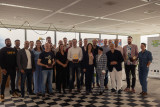
Almere, 6 juli 2023 – Civity is de winnaar van de Green Innovation Hub Contest 2023, waar verschillende start- en scale-ups hun innovatieve oplossing voor een duurzame en inclusieve leefomgeving presenteerden. Dat bepaalde de jury (UPAlmere!, Amsterdam Smart City, BTG, Future City Foundation, Floor Almere, Windesheim, Aeres, Provincie Flevoland, PRICE, Horizon en VodafoneZiggo) gisteren tijdens de Green Innovation Hub Contest tijdens een stormachtige dag. Na een succesvolle pitch won de start-up uit Amersfoort de Golden Award voor hun innovatieve oplossing: een smartcity dataplatform voor de energietransitie. Hiermee verzekert Civity zich van begeleiding om haar concept verder te ontwikkelen, kantoorruimte en tickets voor de Smart City Congres 2023 in Barcelona.
De komende jaren worden er in de provincie Flevoland 130.000 nieuwe woningen gebouwd.. Nederlands grootste bouwopgave. Daarom hebben de gemeente Almere, de provincie Flevoland, VodafoneZiggo en haar partners de handen ineengeslagen met de organisatie van de Green Innovation Hub Contest 2023. Het doel van de wedstrijd is het vinden van innovatieve oplossingen die bijdragen aan een duurzame en inclusieve leefomgeving.
“We zitten in de grootste transitie van de afgelopen 50 jaar, waarin we zowel op ruimtelijk als op sociaal gebied uitdagingen hebben. Het is mooi dat de Green Innovation Hub Contest hier met nieuwe organisaties en nieuwe ideeën mee aan de slag gaat en dat Almere blijft geloven en investeren in groene innovatie.”, aldus hoofdjurylid Jan-Willem Wesselink, programmamanager bij Future City Foundation.
Contest Day
Start-ups en scale-ups konden zich tot 22 juni aanmelden. Uit alle inzendingen heeft de jury tien organisaties met de beste oplossingen geselecteerd. Zij hebben hun producten en diensten gisteren tijdens de Innovation Hub Contest Day gepresenteerd.
“De inspirerende oplossingen die zijn gepresenteerd, dragen allemaal bij aan de ontwikkeling van Almere als een duurzame en natuur-inclusieve stad.” vertelt jurylid Debby Kruit, Ecosystem Advisor UPALMERE! en Startup Mentor bij Startupbootcamp. “Ik kan niet wachten om te zien welke innovaties over een tijdje echt in Almere worden gerealiseerd.”
Golden Award
De oplossing van Civity werd tijdens de finale van de Green Innovation Hub Contest door de jury bekroond met de Golden Award. Dit betekent dat zij meegaan met de partners naar de Smart City Congres in Barcelona en dat zij coaching en ondersteuning ontvangen om hun product verder op te schalen in de markt.
Arjan Eeken, senior Architecture manager en innovatiestrateeg bij VodafoneZiggo: “De presentatie ging niet in op de technologische oplossing, maar op de toegevoegde waarde voor de maatschappij. De meest belangrijke discussie die er is: hoe deel je data voor de energieconsumptie.”
Directeur Roelof Schram van Civity is erg opgetogen: ”Hiermee zetten wij met ons bedrijf een fantastische volgende stap om onze smartcity dataplatform samen met experts verder op te schalen”.
Investeren in de Metropool Amsterdam doen we samen
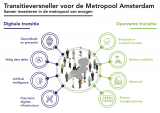
Welke investeringen zijn nodig voor de transitie naar de slimme, groene, gezonde Metropool van Morgen? Onderzoeksbureau Birch bracht het in kaart, in opdracht van de Metropoolregio Amsterdam en Amsterdam Economic Board.
Het rapport van Birch inventariseert de ambities en plannen van regionale kennisinstellingen, bedrijven, maatschappelijke organisaties en overheden. En analyseert welke belangrijke vervolgstappen de regio nog moet nemen. Door voort te bouwen op de aanbevelingen hopen we de mogelijkheid tot investeren in de hele metropool te vergroten.
De focus ligt daarbij op transitie-thema's binnen digitalisering en duurzaamheid:
⦿ Gezondheid en preventie
⦿ Veilig datadelen
⦿ Artificial Intelligence
⦿ Duurzame digitale infrastructuur
⦿ Biobased en modulair bouwen
⦿ Slimme mobiliteit
⦿ Waterstof
⦿ Slimme energiesystemen
Ben jij met jouw organisatie betrokken bij een van die thema's? Lees het artikel en neem contact op om mee te denken over investeringsmogelijkheden.
Demoday #20: Knowledge session ‘Power in Transitions’
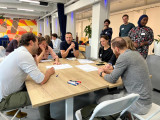
When working together on transitions, it is important to be aware of and sensitive to the impact of power and systemic oppression in participatory processes. Within the Amsterdam Smart City network, the question of inclusion and civic participation, is often brought up in worksessions and discussions. However, we often lack the tools to find the bottlenecks and really include all important beneficiaries.
Therefore, we asked our valued partners Kennisland and DRIFT to lead a workshop about Power in Transitions at Demoday #20 on May 16. Dave van Loon and Faduma Mukhtar (Kennisland) together with Aron Teunissen (DRIFT) taught the participants more about power in transitions, based on the Power Literacy Framework and Field Guide from Kennisland. This guide describes five different forms of power and offers a set of tools for professionals to become more aware of power dynamics in their work.
The five forms of power
According to the Power Literacy Guide by Kennisland, there are five forms of power in design process. If you want to learn more about this, you can download the Power Literacy guide here. The five forms of power are:
Privilege: The type of power you get from a social relation whereby you benefit due to the social group you belong to, at the expense of another social group. It is an unearned advantage and often invisible to those who have it.
Access power: The ability to influence who is included in and excluded from the design project and process.
Goal power: The ability to initiate the design project to begin with, as well as the ability to influence decisions related to framing the problem, goals, and structure of the design process.
Role power: The ability to influence the roles that different stakeholders take on. This includes the ability to assign any roles or titles in the design process, as well as influencing the role each stakeholder plays in making decisions.
Rule power: The ability to influence the way that those in the design process will work together. It includes the ability to influence what is considered normal, what is allowed and what isn’t, how actors will communicate with each other, what language is used, and beliefs about what types of knowledge are valid.
Power check
After a theoretical introduction of the five forms of power, we split into smaller groups to perform a so-called power check for different Amsterdam Smart City projects, such as the Mobility Challenge and “Wat mensen beweegt”. Using this power check, the participants looked at access power and goal power. We identified all actors affected by the project and indicated which actors were not involved. The different actors were then assigned a role in different stages of the process: listener, co-creator, advisor, partner or director.
Most important take-aways
The goal of this exercise was to create more awareness about involving target groups in different stages of the project. The main take-aways were:
The role for the for the ‘benefit group’, the people that are impacted by the project, is often too small. If beneficiaries are involved, this often happens in the last stages of the project. In this phase in the project, it is often more difficult or not possible at all to influence decision-making;
To create equal power, some parties have to ‘give away’ (some of) their power;
Truly inclusive work takes time, effort and money. It is not something takes place overnight;
Awareness is half of the battle: make the topic of systemic oppression in participatory process a structural part of your (work)process).
Want to learn more about power in transitions? Read more.
Green Innovation Hub Contest 2023!
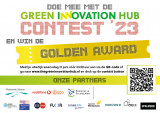
Green Innovation Hub Contest 2023! "Pitch voor Impact"
In Flevoland en Almere worden de komende jaren 130.000 nieuwe woningen gebouwd. De grootste bouwopgave van Nederland! Heb jij een innovatief product of dienst waarmee jij kunt bijdragen aan duurzame en inclusieve leefomgeving. En impact kunt maken op deze regio én de rest van Nederland. Doe dan mee met de Green Innovation Hub Contest 2023 en win de Golden Award.
🏆 Een trip naar Smart City Expo 2023 in Barcelona, coaching door expert, gratis office space, ondersteuning bij businesscases en modellen door partners, V.I.P.-tickets voor Ziggo Dome concert naar keuze en nog veel meer prijzen.
Hoe werkt het?
1️⃣ Doe mee en maak impact met jouw product of dienst.
2️⃣ Meld je uiterlijk woensdag 21 juni vóór 23.59 uur via de onderstaande link.
3️⃣ Op donderdag 22 juni maakt de jury bekend welke start-ups
en scale-ups mogen pitchen.
4️⃣ Mag je pitchen, dan nemen wij contact met je op zodat jij
jouw pitch goed kunt voorbereiden.
5️⃣ Woensdag 5 juli is de Green Innovation Hub Contest Day
waarbij je mag pitchen!
Wil jij deelnemen aan de contest of ben je geïnteresseerd om naar de pitches te kijken? Meld je dan nu aan via de onderstaande link.
'Eerlijk data delen start met goede compliance' – Sander Klous (KPMG)

Het delen van data is een belangrijke motor voor vooruitgang in de samenleving. Ook als die informatie gevoelig is voor privacy en concurrentie. AMdEX, een initiatief van Amsterdam Economic Board en partners, ontwikkelt een manier om data veilig en verantwoord te kunnen delen, met behoud van controle voor data-eigenaars.
Sander Klous (KPMG) is een van de partners die het team achter AMdEX ondersteunen. Dit team werkt aan de ontwikkeling van een 'digitale notaris', die contracten levert aan organisaties die data willen delen. Ook dwingt AMdEX de voorwaarden hierin juridisch af. De contracten ondersteunen eenvoudige datatransacties tussen twee organisaties. Maar ook complexe AI-algoritmen, die toegang moeten hebben tot data die op meerdere plekken is opgeslagen.
Wetten en regels
“Momenteel zijn er geen goede mechanismen om de naleving van de vele regels en voorschriften rond data en AI af te dwingen of zelfs maar te controleren”, zegt Sander Klous. “In andere regelgevingsdomeinen stellen bedrijven als KPMG, als onafhankelijke derde partij, organisaties in staat om hun compliance aan te tonen via een auditproces. Helaas is dit proces ingewikkeld wanneer het gaat om data en AI."
Lees het complete interview met Sander Klous om meer te weten over het belang van eerlijk en veilig data delen.
Opening Green Innovation Hub: startschot voor digitale innovatie in Almere
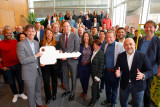
Op woensdag 22 februari heeft de Green Innovation Hub in Almere officieel zijn deuren geopend. De publiek-private samenwerking tussen de Gemeente Almere, Provincie Flevoland en telecombedrijf VodafoneZiggo richt zich op de ontwikkeling van digitale innovaties op het gebied van bouw, voedsel, energie, mobiliteit en (digitale) inclusie.
Almere bouwt de komende vijftien jaar 130.000 nieuwe woningen. Daarnaast wil de gemeente in 2030 klimaatneutraal zijn. Hiervoor is integrale, duurzame en inclusieve gebiedsontwikkeling belangrijk.
Broedplaats
De Green Innovation Hub is een broedplaats voor ontmoeting, samenwerking en innovatie. Partijen ontwikkelen digitale oplossingen voor een gezonde stadsomgeving, lokale voedselzekerheid, mobiliteit, circulair bouwen, energiedistributie en sociale verbondenheid tussen stadsbewoners. Gezamenlijke innovaties worden getest en opgeschaald op speciale ‘greenfield' locaties.
Open ecosysteem
De Green Innovation Hub is een broedplaats voor ontmoeting, samenwerking en innovatie. Partijen ontwikkelen digitale oplossingen voor een gezonde stadsomgeving, lokale voedselzekerheid, mobiliteit, circulair bouwen, energiedistributie en sociale verbondenheid tussen stadsbewoners. Gezamenlijke innovaties worden getest en opgeschaald op speciale ‘greenfield’ locaties. De Green Innovation Hub is een open ecosysteem, waarin partners, het bedrijfsleven, overheden en het onderwijs.
Innovatiekracht
Wethouder Maaike Veeningen: “Met deze samenwerking willen we de innovatiekracht van Almere vergroten. Digitalisering en technologie zijn daarbij onmisbaar, net als de kennis en kwaliteiten van inwoners van onze regio. Met de Green Innovation Hub in het hart van de stad laten we zien hoe belangrijk duurzame en inclusieve gebiedsontwikkeling voor ons is.”
Gedeputeerde Jan Nico Appelman: “Provincie Flevoland ondersteunt van harte de Green Innovation Hub: een plek waar samenwerken, innoveren en ontmoeten centraal staat. Digitalisering én duurzaamheid zijn twee thema’s die belangrijk zijn voor de ontwikkeling onze provincie. Hiermee past de Hub ook uitstekend in de groeiambitie van Almere."
Vragen van morgen
Laura van Gestel, directeur duurzaamheid van VodafoneZiggo: “Als telecombedrijf willen we onze impact op het milieu hebben gehalveerd in 2025. Tegelijk willen we twee miljoen mensen vooruithelpen in de samenleving. Hoe gaan we in de toekomst wonen en werken? Welke rol kunnen we daarin spelen? Belangrijke vragen die grote thema’s raken als zorg en mobiliteit, maar ook klimaatverandering en sociale ongelijkheid. Met de Green Innovation Hub willen we samen oplossingen ontwikkelen voor de vragen van morgen.”
New research on Smart Building Maintenance

Interested in hearing more about Smart Building Maintenance? Feel welcome to join the public defense of the PhD thesis “Crafting Intrapreneurial Stewardship – An institutional perspective on client-led innovation in smart building maintenance“ by Koos Johannes, PhD student in the department of Construction Management. The defense will take place on the 16th of January at 10:30 AM at the Waaier building at the campus of the University of Twente.
About the the PhD thesis
Available research suggests that construction clients, as building owner-occupier, are struggling to implement smart maintenance. This thesis assumes that these reported problems are due to a failure to fully understand the institutional complexities of smart maintenance commissioning in organizational networks. Hence, the aim of this thesis was to improve our understanding of these complexities and to develop theoretical and practical knowledge on the professionalization of construction clients in commissioning smart maintenance through stewardship. Stewardship theory portrays managers and employees as collectivists, pro-organizational and trustworthy, and can be used for designing collaborations based on intrinsic motivation and trust.
The defense will take place on the 16th of January at 10.30 AM at the Waaier building at the campus of the University of Twente.
A summary of the thesis can be read here.
If you want to receive a copy of the thesis, please send a message to: k.johannes@hva.nl
The presentation and defense will be in English; a Dutch summary is available.
Address: Hallenweg 25, 7522 NH, Enschede (see map for parking on the Campus; with public transport the Campus can be reached from train stations Hengelo or Enschede).
Data Dilemma’s Recap: Fair data sharing with Amsterdam Data Exchange (AMdEX)
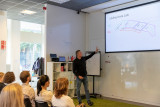
Data Dilemmas is a collaboration between Amsterdam Smart City and the City of Amsterdam’s Data Lab. During Data Dilemmas, we explore the possibilities for using data and new technologies to address urban and societal challenges, with a focus on responsible digitalization. The goal is to use data to make cities more safe, clean and accessible. But what happens to all the data that is collected? Which dilemmas do we encounter when we collect (personal) data to improve the city? These questions are important for everyone: governments, knowledge institutions, companies, and civil society. In the latest edition of Data Dilemmas, hosted on the 29th of September 2022, we invited Joep Meindertsma, Tom van Arman and Jan van Boesschoeten to take us through the experiences, dilemmas and lessons learned from the Amsterdam Data Exchange (AMdEX) initiative. Marit Hoefsloot from Waag gave a critical reflection on the presented Data Dilemmas.
Joep Meindertsma (Dexes) – Introduction to AMdEX
AMdEX is a collaboration between the Amsterdam Economic Board, AMS-IX, Dexes, the University of Amsterdam and Surf. AMdEX aims to give people more control over their data through a secure, trusted and neutral infrastructure which enables sharing data under specific conditions. AMdEX has two missions: give people more control over their data and make it more attractive to share data. These two missions are a data dilemma in itself.
Data exchange is currently monopolized by a handful of major players and the web is more centralized than ever before. The direct connections between people and organisations have become fewer. This is because we’re increasingly using middle-men, services between the data source and the user. Joep explains: “If you want to see someone’s vacation photos, you have to send a request to Facebook. Facebook owns the data, decides who can access it and dictates what the app looks like”. This problem is not limited to vacation photos or Facebook. It is about all our data. Almost all services are middle-men, with its own closed way of data sharing. This creates data silos – places where data is effectively locked away.
Joep refers to three types of data: “data we want to share, data we don’t want to share, and data we might want to share.” This ‘might share’ category often contains valuable data, but it can be costly or difficult to share. Set conditions makes sharing this data easier. AMdEX makes this possible through a few software projects they’re currently building: eFlint (a new language to describe legal constructs), DexPod (an open source personal data server) and Atomic Data (a specification and open source software to improve data interoperability).
Tom van Arman (Tapp) - AMdEX case study: Marineterrein Sensor Data
Meanwhile, the Marineterrein in Amsterdam is full of sensors, collecting all kinds of data. Think of MicroLAN measuring the water quality, or Public Eye collecting crowd data. Marineterrein is a ‘living lab’, where technologies that contribute to a sustainable and future-proof city can be tested. Together with AMdEX, Tom looked at how the collected data can be made accessible to third parties, such as researchers, journalists, students, artists and entrepreneurs. The Marineterrein and the data collectors, for example Public Eye, set conditions for the data to be used. Tom describes how this works in practice: “If a journalist is interested in using crowd data collected by Public Eye, they must be a member of the Marineterrein community and subscribed to AMdEX. If the journalists meets these requirements, they will receive an AMdEX email with a data download link.”
Jan van Boesschoeten (AMS-IX) - The Future of AMdEX
As Joep and Tom already mentioned, there are many questions around data: who owns the data, what are you allowed to do with it? How do you work together with your competitors to get more value out of your data? A data exchange can be a solution to these questions. This is why AMS-IX, a neutral member-based association that operates multiple interconnection platforms, is connected to AMdEX. Jan shortly describes the future of the AMdEX initiative. The field lab with use cases ends in June 2023, and at that time AMdEX also aims to be a legal entity. Additionally, one of their use cases involving KLM will be presented at AMS-IX’s MORE-IP community event in June. After that, AMdEX will onboard new use cases.
Marit Hoefsloot (Waag) – A critical reflection on the Dilemmas encountered in AMdEX
Last but not least, Marit Hoefsloot from Waag reflects on the dilemma’s presented by Joep, Tom and Jan. Marit describes that the use of data is often seen as an act of notion, whilst privacy is more of a passive notion (not using the data at all). However, it’s possible to use data whilst also protecting ones privacy. A good example of this is IRMA, a privacy-friendly digital wallet which can be used for authentication. As Marit pleads: “Data usage and privacy are not necessarily contradictory, it is about both.” Organisations should see protecting privacy as their own responsibility, instead of giving the illusion of consent with an opt-in or opt-out option.
The second dilemma Marit reflects on is about developer productivity vs. standardisation. Standardisation takes a lot of time, which takes away from innovation and productivity. However, you need standardisation to develop these kind of exchange platforms, as there are many organisations that are involved. Marit describes that the real questions we should talk about are: what is the flexibility of the standard? Do we create the standard together, or more top-down through legislation? Who are we standardizing for? “We should prioritise standardisation, but do it in an open and inclusive way.”
Would you like to join our next Data Dilemmas at Datalab? The upcoming session is scheduled on the 8th of December (topic and speakers to be announced). Keep an eye out on our platform for the programme!
Photography: Myrthe Polman
Lector Nanda Piersma (HvA) benoemd tot hbo-kroonlid Sociaal Economische Raad

We zijn trots bij de Hogeschool van Amsterdam met de benoeming van lector Nanda Piersma tot kroonlid van de Sociaal-Economische Raad (SER). De ministerraad stemde vrijdag in met haar benoeming. Het is de eerste keer dat een lector kroonlid wordt van de SER.
Piersma is benaderd vanwege haar expertise op het gebied van digitalisering. Volgens de SER is digitalisering in steeds meer kwesties actueel. Piersma is lector Responsible IT bij de HvA. Ook is zij wetenschappelijk directeur van het HvA Centre of Expertise Applied Artificial Intelligence. Daarnaast is Piersma betrokken bij verschillende landelijke netwerken rondom datawetenschap zoals het platform Praktijkgericht ICT-onderzoek (Prio) en de Nederlandse AI coalitie (NLAIC). Lees meer.
Stay up to date
Get notified about new updates, opportunities or events that match your interests.

